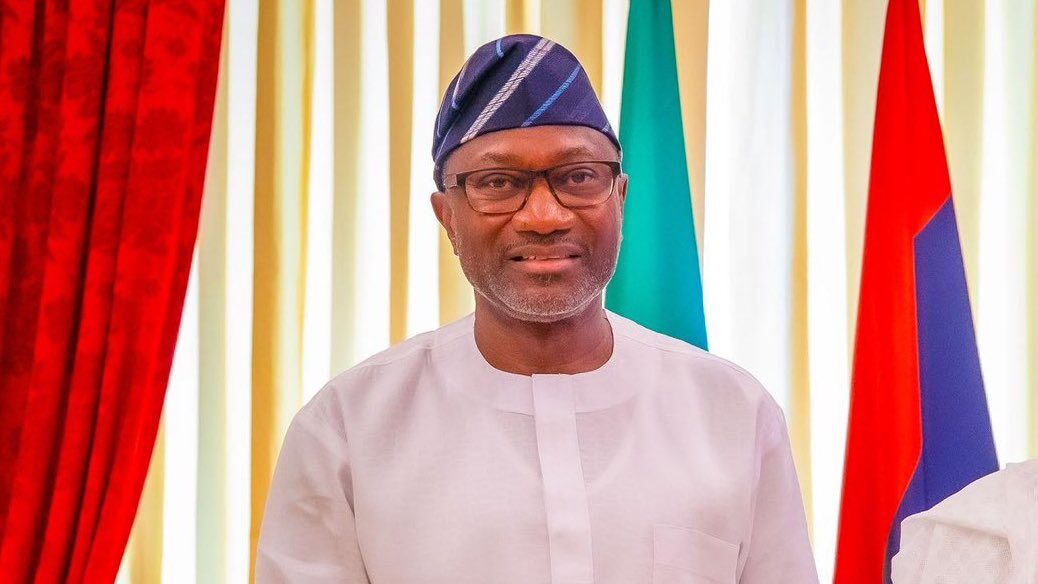He accused the DSS of overstepping its mandate and suppressing peaceful dissent. ArticlesRead More
Tinubu: Nigeria Will Come Out Of Religious Intolerance Allegations Bold, Stronger
Tinubu: Nigeria Will Come Out Of Religious Intolerance Allegations Bold, Stronger
* Says the inconsistent narrative is being handled with utmost seriousness
Deji Elumoye in Abuja
President Bola Tinubu has expressed confidence that the Nigerian nation will emerge stronger amid religious intolerance allegation by President Donald Trump of the United States.
He assured Nigerians that the inconsistent narrative is being handled with utmost seriousness and depth.
Information and National Orientation Minister, Mohammed Idris, who made this known to newsmen at the State House, Abuja on Tuesday after a routine meeting with the president, assured Nigerians that President Tinubu remains calm deploying multi-pronged approach to addressing concerns raised by Washington while meticulously reviewing all dimensions of the issue.
According to the minister, the Nigerian Government is giving preference to constructive engagement over inflammatory rhetoric.
He noted that: “Coordinated efforts are underway across relevant government agencies, while new channels of communication have been opened with international organisations to deepen understanding of Nigeria’s ongoing reforms and future strategies.”
Idris further said: “The initiative is designed to address both domestic and international concerns through transparency, sustained dialogue and demonstrable commitment to tolerance, security and national cohesion.
“Of course, the issue of the U.S threats also came up and we discussed that extensively with Mr President and Mr President is calm. He is looking at the whole situations and he is looking for ways and means of ensuring that the International community understands what Nigeria has been doing.
“Only two weeks ago, Mr President in his own desire to rekindle the security architecture of the country reinvigorated the hierarchy of the Armed forces. A new Chief of Defence Staff and other service chiefs were appointed. These were all the issues that came out before the US concerns. So, that tells you that Mr President has been working assiduously to ensure that Nigeria is a country that remains safer for all Nigerians to live in.
“We are looking at all the issues and we don’t want to overheat discussions but work is ongoing and we have also opened channels of communication for international organisations to understand what Nigeria has been doing better and what we intend to further do to ensure that whatever concerns that there are either domestically here or from the International communities are being answered.”
The minister stressed that President Tinubu has continued to engage religious leaders across the country in sustained dialogue aimed at strengthening unity and understanding among Nigerians of all faiths.
His words: “it is a multiple approach, discussions with the leadership of religious groups is an ongoing efforts. Mr. President has been meeting with them and he will continue to do so. They are all Nigerians and he is leading them; they are of course important stakeholders in the Nigerian project.”
Idris reaffirmed that the president will continue to engage actively with the international community not only the United States, but also regional and continental bodies to strengthen cooperation in addressing security challenges and correcting misconceptions about Nigeria.
He said government remains determined to eliminate criminal elements whose actions have contributed to misleading global narratives about the country.
“Yes, Mr. President will continue to engage with the international community not just U.S; everyone the regional bodies. The continental bodies and everyone that we think has a role to play in ensuring that Nigeria succeeds in ridding this country of this criminal element that are helping the world to drive this narrative to give Nigeria a very bad name and we know that this is not who we are as a country. So for us to be characterised as a country that is not tolerant when it comes to religion is not accurate, this is absolutely false,” he said.
The minister called on Nigerians to look beyond divisive rhetoric and unite against extremists seeking to sow discord, warning that those driving false religious narratives are attempting to undermine the country’s peace and cohesion.
Idris explained that Nigeria’s diversity remains a source of strength rather than division.
According to him, “Nigeria has Muslims and Christians and even those who even do not believe in any of these religions. And our constitution guarantees everyone should practise their faith without hindrance and Mr. President is going to respect that to the letter.
“Again, we have this security challenges but no where has there been any decision to favour one religion or the other or to inflict violence over one religion.
“What has happened is that we have these extremists that are driving this narrative and their desired outcome is to see that this country is divided and we want to caution Nigerians to look deeper. This is a time for us to reflect on our nationhood; to reflect on our unity; this is not the time for division. This is not the time for rhetoric, it is not the time for nation building. It is the time for calling for everyone to come together so that we can continue to have a Nigeria of our dream.
“Mr President is calm, he’s taking this of course very seriously and all those that should look at this issue are looking at them with all the responsibilities and the depth that it requires so that at the end of the day, we will come out of this. We believe that we will come out of this very strongly.”
* Says the inconsistent narrative is being handled with utmost seriousness Deji Elumoye in Abuja President Bola Tinubu has expressed confidence that the Nigerian nation will emerge stronger amid religious



